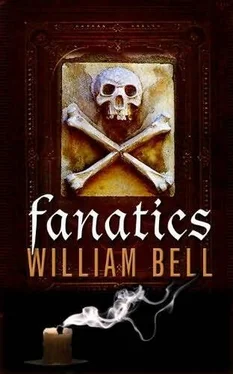I was relieved that the whole issue had been resolved. The bad guys had been rounded up and Mom was staying put-for the time being, anyway.
Raphaella hadn’t taken the camo-boys seriously, but now she’d have to. Mom had it right. There was nothing funny about them. I figured some of them-like the one I had seen taking a leak at the camp-were losers, but even losers can be dangerous. An explosion in an enclosed underground train depot like Union Station, with thousands of commuters packed onto the platforms or streaming up and down the stairways, would be a bloodbath, ripping countless bodies to shreds. If the terrorists had been able to carry out their missions there would have been blood on the walls in other parts of the city, too.
And all for what? An Islamist state based on Sharia law? In North America? How realistic was that? The camo-boys must have left their sanity out in the bush somewhere.
Of all the revolting, cowardly acts humans were capable of, planting a bomb and walking away to safety had to be one of the most despicable. Killing was bad enough. Murdering without even knowing or caring whose blood you spilled was worse. And suicide bombers? A bunch of cowards brainwashed by soul-dead manipulators. They boarded a bus or walked into a crowded market and thumbed a button, vaporizing themselves and tearing dozens of strangers to bloody fragments. They didn’t even have the guts to stay around and witness the carnage.
Guys like the Severn Ten were not freedom fighters or soldiers of God. They were vermin who crawled out of the woodwork when the sun went down. They wanted a theocracy. Professor Corbizzi had warned that Savonarola had wanted a theocracy, too. Government according to the will of God. Different religion, same objective. As far as I knew, Savonarola had never planted a bomb and beetled home to wait for the body parts to fly, but he had called for the death of his political enemies, and the burning of “sinners” and their “vanities.”
I picked up the remote and shut off the TV, recalling Raphaella’s question in Professor Corbizzi’s library not long ago. Was it the religion that was to blame or the people who practised it-the songbook or the singers? She had wondered if evil people used their religion as a cover for their own immorality, an excuse to kill and maim. The pope who signed the order to torture and hang and burn Savonarola would have said he was doing the will of God. He was also snuffing out a personal enemy who had urged reform of the Church and removal of corrupt men like him. If the camo-boys had succeeded in bombing Union Station they’d likely have shouted, “God is great!” but they would have meant “Aren’t we wonderful!”
The news reports had harped on about the Severn Ten being Muslims, as if every Muslim in the country was a terrorist. It wasn’t religion or holy texts that killed. It was people who read the books and used bits of what they picked off the pages to justify their deeds, the way the ancient Greeks in the old blue book of myths on my bookshelf had used the Fates.
“God made me do it” or “God wanted me to do it” was a lie.
FOR THE TIME BEING, MOO had taken over Raphaella’s life. As stage manager she had to be on hand for each full rehearsal and every performance-a responsibility I’d have run from but Raphaella enjoyed. The show had a three-night run. Opening night found me backstage, sitting on a chair out of everyone’s way. Although I hated musicals, I was energized by the performers in early-twentieth-century costumes who entered and exited according to Raphaella’s cues and sang their comical songs with more enthusiasm than skill. In her all-black outfit and wire-thin headset, holding a clipboard in one hand and a mechanical pencil in another, she reminded me of the day soon after we had met. Frustrated by her ignoring me, I marched across Mississauga Street, bashed through the backstage door, found her working a rehearsal of the Sound of Music , and declared that I had loved her since the moment I first saw her. Amazed at myself for blurting out such a terrifying admission, I was even more thunderstruck when she dropped her clipboard and kissed me on the mouth in a way I’d never been kissed before.
MOO’s opening night was a smash. The following shows sold out. As the cast and directors had hoped, they were invited to give a benefit performance for the World Youth Congress at Geneva Park, the conference centre on the east shore of Lake Couchiching. The producer consulted the two directors and the cast, who all agreed, and after a day’s rest, Raphaella, the directors, and the musicians went out to Geneva Park in the morning to set up and do a thorough sound check.
“Want to come with me for the performance?” Raphaella asked me on the phone that afternoon. “You can give me a ride out and back.”
I picked her up after an early supper and we rode out to Geneva Park, motoring through the Chippewas of Rama territory and past the busy casino. We turned off Rama Road, followed a tree-lined lane to a gatehouse, where we signed in and received photo-ID badges from blue-clad rent-a-cops, and parked in the lot nearest the conference centre, where the performance would be held. I noticed several security personnel in similar outfits near the main building.
Inside, teenagers of all sizes and shapes and wearing a wide variety of dress styles wandered around in small groups, obviously on a lull between laid-on activities, chatting in languages I didn’t recognize. Chairs had been arranged in front of the stage. Music stands stood skeletally off to the side. Raphaella and I went backstage, where Mr. and Mrs. Director were arguing about something.
“I’d better get out of your hair,” I said. “Maybe I’ll go for a walk.”
Handing me the PIE, she replied, “Take care of this for me? I forgot to leave it at home.”
Raphaella had a rule that no cells were allowed backstage. People said they’d turn them off, then they’d forget. I shoved the PIE into my pocket and gave Raphaella a kiss.
“See you later,” I said. Then, nodding toward the warring directors, “Good luck with the children.”
A crew of groundskeepers were tending to the lawn and shrubs in the open area beside the main building, cutting and trimming and raking, looking overheated in their brown uniforms and baseball-style hats. According to the map in the pamphlet I had picked up at the gate, the centre occupied a forested peninsula intersected by pea-gravel trails connecting tennis courts, sleeping cabins, outbuildings, patios, and the beach. I followed the path toward the lake. At the shore I came to a boathouse and dock, where a security guard who looked as if she’d rather be just about anywhere else stood sentry. I continued along the edge of the water until I got to a stand of white pines. I walked a few steps into the green grove, the mantle of fallen needles springy under my feet, and sat down, leaning against one of the trees. The lake was bright with late-afternoon sunlight, shimmering in the still air, the green water along the shore fringed with spiky grass and sand.
Chiefs Island lay off to the southwest, between me and Wicklow Point, where Mrs. Stoppini was probably writing letters in her study or reading over a glass of Chianti, alone in her big empty mansion. No, not quite alone, I reminded myself, and shivered. The friar was there, too, lurking. I asked myself again how Raphaella and I could force the spirit to slink away for good, and as always I was stuck for an answer.
I opened the pamphlet I had picked up at the gate, curious about the World Youth Congress just under way. The teenage participants had come from all over the world, representing more than two dozen countries. No wonder there were rent-a-cops around, I thought. The congress brought the kids together to inspire “mutual understanding and cooperation between cultures,” through activities like “team-building” and “goal-oriented tasks that encourage and reward collaboration.” I hoped that meant the kids could have fun together and get to know one another by sailing, swimming, playing games, and generally horsing around.
Читать дальше












